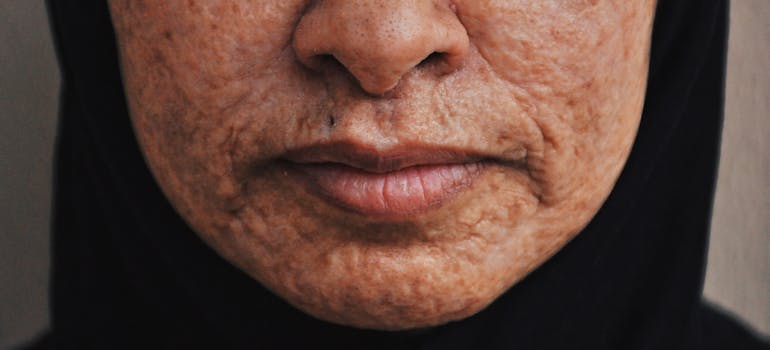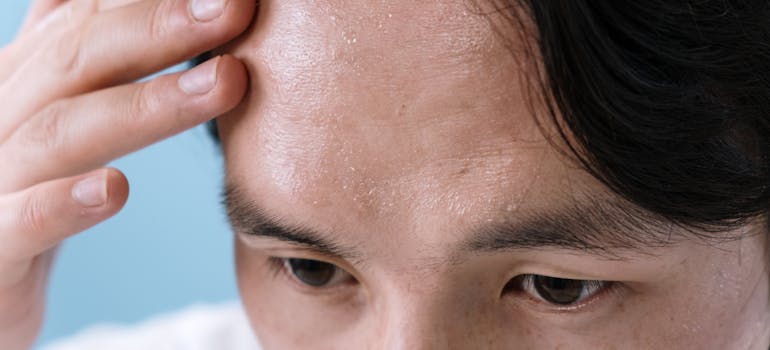Drug abuse is a big problem that affects many parts of our lives, including our skin. When we talk about “How does drug abuse affect skin health?” we’re looking at how using drugs can harm our skin’s appearance and health. Our skin is like a mirror that shows the effects of drug misuse. In West Virginia, many rehabs centers help people recover from drug abuse and also take care of their health. Understanding the relationship between drug misuse and skin health is crucial for making better choices for overall well-being and maintaining healthy skin.
The Effects of Substance Abuse on Skin Wellness
There are many issues that drug abuse can cause for our skin, and we’re going to talk about each of them in this article. Understanding how drug abuse affects skin health can help us see the impact of drug dependency on skin condition. Some of the problems we’ll discuss include:
- Dryness and dehydration
- Skin infections
- Track marks and scars
- Acne and skin irritations
- Skin picking and scratching
- Pale or jaundiced appearance
- Premature aging
- Vascular issues
- Increased sensitivity to sun damage

Thirsty Skin: The Dehydrating Effects of Drugs
Dryness and dehydration are common skin issues you might face if you’re dealing with drug abuse, especially when using opioids and stimulants. These drugs can throw off your skin’s natural moisture balance, leaving it dry, flaky, and dull. Dehydration doesn’t just affect how your skin looks; it can also make it feel uncomfortable and increase the risk of other skin problems.
Educated substance abuse treatment WV programs, like ours, focus on comprehensive care, including rehydrating your body and restoring your skin’s health. Tackling dehydration is an important step in improving your skin’s appearance and your overall well-being as part of your recovery journey.
Under Attack: Skin Infections from Drug Abuse
Skin infections are a serious concern if you’re using drugs through injection. This method can expose your skin to bacteria and other harmful organisms, leading to infections like abscesses, cellulitis, and even more severe conditions. These infections can cause symptoms such as:
- redness
- swelling
- pain
- pus-filled sores
If you decide to seek help for your substance abuse problem, you should be aware that inpatient drug rehab in WV can play a crucial role in treating skin infections caused by the drug abuse. These programs provide a controlled environment where you can receive medical care for your infections while also addressing your substance abuse issues. Getting proper treatment for skin infections is a critical part of your recovery process, helping you heal both physically and emotionally.
Lasting Marks – The Scars of Addiction
Track marks and scars are telltale signs of injection drug use, often appearing on areas like the arms or legs. These marks can be red, bruised, or discolored, and over time, they can become permanent scars, affecting your skin’s appearance and your self-esteem.
You can minimize these marks and scars if you enter our partial hospitalization program West Virginia residents rely on. We will offer you a supportive environment where you can focus on your recovery while receiving care for your skin. Treatments may include therapies to improve skin healing and reduce scarring. By addressing both your substance abuse and its impact on your skin, you can regain confidence in your appearance and take a significant step towards a healthier, drug-free life.

Troubled Skin – Acne and Irritations from Stimulants
Skin conditions such as acne and skin irritations are common consequences of drug abuse, particularly when using stimulant drugs like cocaine or methamphetamine. These substances can increase oil production in the skin, leading to clogged pores, inflammation, and breakouts. The resulting acne and irritations can cause pain and significantly impact one’s self-esteem and overall well-being.
A flexible and reliable way to manage these skin issues while continuing your recovery journey is to start an intensive outpatient program West Virginia inhabitants speak highly of. These programs provide access to dermatological treatments and guidance on skincare routines that can help reduce the severity of acne and irritations. Addressing these skin problems is an important step in healing both your body and mind as you work towards overcoming substance abuse.
Uncontrollable Urges: The Damage of Skin Picking
Compulsive behaviors such as skin picking and scratching can be triggered by drug abuse and can cause significant damage and scarring to the skin. This can further worsen the impact of drug abuse on the skin’s health. These behaviors are often the result of the psychological effects of drug abuse, such as the sensation of bugs crawling on the skin or intense itching, which are common side effects of certain drugs.
If you want to address these psychological aspects and get to the root of your problems, you might want to look into long term drug rehab WV offers. These programs provide therapy and support to help you understand and manage the underlying issues that lead to compulsive behaviors. By focusing on mental health as well as addiction, long-term rehab can help reduce the urge to pick and scratch, promoting healthier skin and a more positive recovery journey.

Color Changes: The Impact of Drugs on Skin Tone
A pale or jaundiced appearance is one of the skin health consequences of drug misuse. This change in skin color can be due to the negative impact of drug abuse on liver function. When the liver struggles to process toxins from drugs, it can lead to jaundice, which causes a yellowing of the skin and eyes. Additionally, drug abuse often leads to nutritional deficiencies, further affecting your skin’s health and appearance.
A trustworthy and safe way of addressing your liver and addiction issues is by entering one of the more respected drug rehab centers in West Virginia. Rehab helps you detoxify your body, restoring liver function and improving skin coloration. It also provides nutritional support to address deficiencies and promote healthier skin. By focusing on recovery and overall health, drug rehab in West Virginia can help you regain a natural, healthy complexion.
How Drugs Accelerate Skin Aging
Premature aging is one of the more noticeable skin health ramifications of substance abuse. The harmful substances in drugs can accelerate the aging process, leading to early signs of aging such as wrinkles, fine lines, and sagging skin. This occurs because drugs can damage the collagen and elastin fibers that provide strength and elasticity to the skin.
As a result, your skin may lose its youthful firmness and start to appear older than your actual age. Additionally, the overall appearance of your skin can become dull and lifeless due to the lack of proper nutrients and hydration, which are often neglected in the midst of substance abuse. Addressing drug abuse is essential to halt the premature aging process and restore a healthier, more vibrant complexion.

Vascular Problems from Drug Use
Vascular issues are a significant concern for those who use drugs intravenously. This method of drug use can damage blood vessels, leading to a range of problems that affect the skin. One common issue is the appearance of dark or discolored patches on the skin where the blood vessels have been harmed.
Additionally, damaged blood vessels can impair circulation, which is crucial for healthy skin coloration and effective wound healing. When circulation is compromised, wounds may take longer to heal, and the risk of infection increases. Furthermore, poor circulation can lead to a lack of oxygen and nutrients reaching the skin, causing it to appear dull and lifeless.
Drug-Induced UV Vulnerability
Increased sensitivity to sun damage is one of the skin health impacts of drug abuse. Certain drugs, such as opioids and benzodiazepines, can make your skin more susceptible to the harmful effects of ultraviolet (UV) rays. When your skin is more sensitive to the sun, you’re at a higher risk of experiencing sunburns, even after short periods of exposure.
Prolonged sun exposure can further exacerbate this issue, leading to premature aging, increased risk of skin cancer, and other sun-related skin conditions. It’s important to be aware of this heightened sensitivity and take extra precautions to protect your skin, such as using broad-spectrum sunscreen, wearing protective clothing, and seeking shade during peak sun hours. Understanding the connection between drug abuse and increased sensitivity to sun damage is crucial for maintaining healthy skin and preventing long-term damage.
The Psychological Impact on Skin Health
The skin is often referred to as the “mirror of the mind” because it reflects our emotional and mental state. The connection between psychology and dermatology is evident, especially when considering the impact of substance abuse on skin health. Here, we explore four key areas where psychological factors influenced by drug abuse can manifest on the skin.

Stress-Induced Skin Problems
Stress is a common trigger for many skin conditions, and substance abuse can significantly heighten stress levels in individuals. When the body is under stress, it releases cortisol, a hormone that can increase oil production in the skin, leading to acne outbreaks.
Additionally, stress can exacerbate conditions like eczema and psoriasis, causing flare-ups that result in red, itchy, and inflamed skin. The cycle of stress and skin problems can be challenging to break, especially when substance abuse is involved, as drugs and alcohol are often used as coping mechanisms for stress, yet they ultimately worsen the condition.
Anxiety and Its Effects on Skin
Anxiety, closely linked with stress, can also have a detrimental impact on skin health. It can manifest physically in the form of hives, rashes, and itching. These symptoms can be distressing and may lead to a compulsive scratching or picking at the skin, causing further damage and potential infections.
The constant worry and nervousness associated with anxiety can disrupt sleep patterns, which is crucial for skin regeneration and healing. Therefore, managing anxiety is key to maintaining healthy skin, particularly for those struggling with substance abuse.
The Cycle of Addiction and Skin Damage
Substance abuse’s effects on skin wellness are profound, and the psychological grip of addiction can lead to behaviors that directly harm the skin. Compulsive skin picking, a behavior often observed in individuals with addiction, can result in open sores, scabs, and scars. This behavior is not only a physical manifestation of the psychological turmoil but also a coping mechanism for the emotional pain associated with addiction.
In such cases, individual therapy for addiction can be an effective treatment, addressing both the psychological aspects of addiction and its physical manifestations on the skin. By tackling the root causes of addiction and providing coping strategies, therapy can help break the cycle of addiction and promote healthier skin.
Depression and Skin Care Neglect
Depression is a common psychological issue associated with drug abuse, and it can significantly affect an individual’s self-care routines, including skincare. People suffering from depression may neglect their skin care, leading to a deterioration in skin health.

This neglect can result in dry, dull skin, and can exacerbate existing conditions. Furthermore, the lack of motivation and energy that characterizes depression can make it challenging for individuals to seek treatment for their skin issues, creating a vicious cycle of neglect and deterioration.
Healing the Damage: The Path to Skin Recovery
The various skin issues we’ve discussed, from dehydration to increased sensitivity to sun damage, highlight the significant impact of drug abuse on our skin’s health. It’s clear that drug abuse and its influence on skin well-being are interconnected, with substance misuse leading to a range of dermatological problems. If you acknowledge these effects early, you can take the first step towards recovery and restoring your skin’s health. Remember, it’s never too late to seek help and make positive changes for your skin and overall health.



